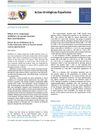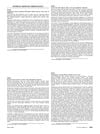2 citations,
October 2021 in “Journal of Cosmetic Dermatology” Finasteride is more effective and satisfactory than montelukast for treating moderate acne in women.
 1 citations,
October 2023 in “Romanian Journal of Morphology and Embryology”
1 citations,
October 2023 in “Romanian Journal of Morphology and Embryology” COVID-19 can cause various skin issues, but long-term skin problems are rare.
 July 2019 in “Journal of Investigative Dermatology”
July 2019 in “Journal of Investigative Dermatology” The research found that male pattern hair loss is mostly genetic and involves hair thinning due to hormonal effects and changes in gene expression.
[object Object] 41 citations,
May 2020 in “Frontiers in immunology” Hidradenitis suppurativa might be a type of autoinflammatory skin disease.
 March 2009 in “Medical & surgical dermatology”
March 2009 in “Medical & surgical dermatology” Women with androgenetic alopecia have fewer terminal hairs, phenol in nail surgery is safe, and a new hair transplant method is faster and less damaging.
 April 2021 in “Sohag Medical Journal”
April 2021 in “Sohag Medical Journal” Alopecia areata is an autoimmune condition causing hair loss, linked to genetic factors and immune system issues, with no cure yet.
 October 2012 in “Faculty Opinions – Post-Publication Peer Review of the Biomedical Literature”
October 2012 in “Faculty Opinions – Post-Publication Peer Review of the Biomedical Literature” Six new genes linked to early hair loss were found, which also surprisingly connect to Parkinson's disease and lower fertility.
 36 citations,
July 2011 in “Journal of The American Academy of Dermatology”
36 citations,
July 2011 in “Journal of The American Academy of Dermatology” People with hair loss have higher risk of high blood sugar and diabetes, and lower levels of a specific hormone.
 December 2021 in “The Sri Lanka Journal of Dermatology”
December 2021 in “The Sri Lanka Journal of Dermatology” COVID-19 can cause various skin issues, including rashes and lesions.
 August 2024 in “Clinical Cosmetic and Investigational Dermatology”
August 2024 in “Clinical Cosmetic and Investigational Dermatology” Hypothyroidism may cause certain types of hair loss.
 7 citations,
September 2017 in “Biomedical and Pharmacology Journal”
7 citations,
September 2017 in “Biomedical and Pharmacology Journal” Growth factors greatly affect hair loss, with different levels seen in men, women, younger patients, and at the start of the condition.
 April 2017 in “Actas urológicas españolas”
April 2017 in “Actas urológicas españolas” 5-alpha reductase inhibitors increase the risk of sexual dysfunction in patients treating enlarged prostate but not in those treating hair loss.
 February 2010 in “Journal of The American Academy of Dermatology”
February 2010 in “Journal of The American Academy of Dermatology” A woman with thymoma developed a rare chronic condition similar to graft versus host disease after surgery.
2 citations,
December 2023 in “International journal of molecular sciences” Understanding keratinization is crucial for treating skin conditions like ichthyoses and psoriasis.
 3 citations,
July 2021 in “International journal of environmental research and public health/International journal of environmental research and public health”
3 citations,
July 2021 in “International journal of environmental research and public health/International journal of environmental research and public health” Two patients developed complete hair loss after Alemtuzumab treatment for MS, with no regrowth after two years.
1 citations,
August 2024 in “Cosmetics” Melasma treatment is difficult, but combination therapies and personalized plans show promise.
 February 2010 in “Journal of The American Academy of Dermatology”
February 2010 in “Journal of The American Academy of Dermatology” Women with androgenetic alopecia may have higher blood pressure levels.
 February 2010 in “Journal of The American Academy of Dermatology”
February 2010 in “Journal of The American Academy of Dermatology” The document concludes that using gadolinium-based contrast agents during MRI can be linked to Nephrogenic Systemic Fibrosis in patients with severe kidney disease.
 February 2010 in “Journal of The American Academy of Dermatology”
February 2010 in “Journal of The American Academy of Dermatology” A woman with Degos disease managed her condition for nine years with medications and had two healthy pregnancies, while a separate finding suggests a possible link between female pattern hair loss and high blood pressure.
 37 citations,
January 2010 in “Acta dermato-venereologica”
37 citations,
January 2010 in “Acta dermato-venereologica” People with early onset baldness have higher bad cholesterol and lower good cholesterol, increasing their heart disease risk.
1 citations,
January 2024 in “Pharmaceuticals” A new carrier improves skin delivery of tofacitinib for treating inflammatory skin diseases.
 84 citations,
April 2005 in “Dermatologic Clinics”
84 citations,
April 2005 in “Dermatologic Clinics” Treatments for melanin disorders exist, but more effective options needed.
 5 citations,
March 2021 in “International Journal of Dermatology”
5 citations,
March 2021 in “International Journal of Dermatology” Biotin supplementation during isotretinoin treatment for acne may help maintain skin hydration and improve hair growth.
 6 citations,
May 2022 in “Medicina-lithuania”
6 citations,
May 2022 in “Medicina-lithuania” IMA may indicate oxidative stress in skin and hair disorders, but more research is needed.
 24 citations,
June 2018 in “Reviews in endocrine and metabolic disorders”
24 citations,
June 2018 in “Reviews in endocrine and metabolic disorders” Thyroid diseases may contribute to autoimmune skin diseases, and more research is needed on their relationship.
[object Object] 
The woman has a scalp condition causing hair loss.
 18 citations,
May 2017 in “Experimental Dermatology”
18 citations,
May 2017 in “Experimental Dermatology” AMT may cause hair loss and changing dWAT activity could help treat it.
 February 2023 in “Frontiers in Bioengineering and Biotechnology”
February 2023 in “Frontiers in Bioengineering and Biotechnology” Optical imaging and light therapy show promise for diagnosing and treating liver injury caused by surgery.
 4 citations,
July 2019 in “Children (Basel)”
4 citations,
July 2019 in “Children (Basel)” The review concludes that more research is needed to better improve the health outcomes for people with Polycystic Ovarian Syndrome.
 January 2025 in “Acta Dermato Venereologica”
January 2025 in “Acta Dermato Venereologica” Mothers with alopecia areata have a higher risk of adverse birth outcomes.
























